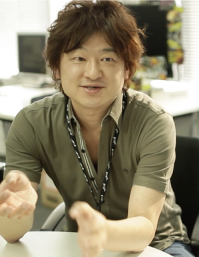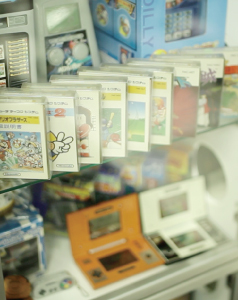Carrying Forward Gaming Culture
Atsushi Inaba (Executive Producer): Atsushi Inaba has helped produce almost every game Platinum has released to date. His role is to support and manage each project’s team.
Hideki Kamiya (Director): Hideki Kamiya has been a director of such games as Resident Evil 2, Devil May Cry, Viewtiful Joe, Okami, Bayonetta, and the Wonderful 101. His job is to create a vision for the project and act upon it.
Remember the times when almost every day you’d go to some friend’s house in the neighborhood and spend the whole afternoon playing video games? I’m sure there are a lot of us who can answer yes to that question. Out of the ones who can are two of the founders of PlatinumGames, Atsushi Inaba and Hideki Kamiya. Now working as an Executive Producer and a Director, this interview delves into why they chose to work in the game industry.
Why I Make Games
Inaba: The first time I thought I wanted to make games was when I was 12 years old. The PC-8801 was at its peak, and I played games all the time. Back then, hardware and software were fairly simple, to the point that the art, sound, and even programming were often handled by a single person. If you wanted to make games, the easiest way in was to learn how to program, and that’s exactly what I did.
Kamiya: I got into making games in almost the same way Inaba did. I said I wanted to study programming and my parents bought me a computer. Ultimately I played a lot more than I programmed though (laughs).
Inaba: It used to be that you had to go to an arcade to play anything, so it was amazing to actually be able to play games in your own home.
Kamiya: Back then, hardware had limited capabilities, but their limitations made them very logical in design. They were almost like paper, rock, scissors in a way. You would pick from a small number of options, and what you chose determined whether you would win or lose. They were simple with easy to comprehend rules. I entered the industry during the Playstation era, so these kind of games were already long out of production. The first game I worked on would be Resident Evil (which used polygons to make 3-D characters and environments), so I never got to work on a 2-D game.

Inaba: The PlayStation really ushered in a time of change for video games. I think that’s what first brought us together.
Kamiya: My approach to making games is mostly spontaneous so there’s some doubt as to how well my style would have fit with the logical design methods of the 8-bit era. Maybe that’s why I’m drawn to them so much.
Inaba: They definitely have a unique appeal. What I find so amazing about 8-bit games is how I can remember the smallest of details about them, even now. I can still remember buying certain games, how excited I was.
Kamiya: It’s too bad but I don’t feel like the games of today can inspire memories as vivid as the ones back then did. Maybe it’s just because I’m older now. It was different when I was a kid. Back when I was most impressionable, back when I would absorb anything like a sponge, I chose games over school, and that’s what really defined who I am. Ummm, I’m not saying you shouldn’t go to school, kids.
Inaba: When you’re a kid, you have no income, so you put an unbelievable amount of concentration into that one quarter you have to spend at the arcade. You would grip the quarter tight in your hand and think, “I’ve got one shot. I can’t let it go to waste.” So much weight was placed on each attempt, it’s no wonder I remember them all so well.
Kamiya: When my parents brought me to a big department store I would think extremely carefully about the most effective way to spend the little cash my parents gave me. I’d take a good look at everything there and make sure I chose whatever gave me the most for my money. That’s probably how those dot graphics and bleeping sounds became so deeply etched into my identity. They still really mean a lot to me.
Inaba: When I was in middle school I’d frequently drop by the arcade near my house. Getting a new machine in was a big deal. My friends and I would all try to guess what it might be. Also, games didn’t get soundtracks released back then, so you’d have to hold a tape recorder next to the cabinet and record the BGM live. Usually you’d do it while you or somebody else was playing so you’d get a lot of sound effects thrown in—enemies blowing your ship up and the like.
Kamiya: Everyone was engrossed in countdown music shows and pop radio and whatever. I couldn’t care about any of that in the least. Back in 1985, I was all about Gradius. I was still in my first or second year of middle school, but I don’t think I’ve ever felt anything that can top how I felt then. I would go home and strategize endlessly about how to clear that one part I couldn’t get past yet (laughs). Before I knew it, I couldn’t take it anymore and I would jump on my bike, going as fast as I could to the arcade, wearing pretty much pajamas.
Inaba: I feel where you’re coming from. The smallest amount of money and time used to have so much value to me back then. All of those “unfair” games really honed our gaming skills. The NES especially—so many games spared absolutely no mercy for the player. For the survivors of that era like you and me, a lot of the games today feel like a complete pushover. They’re too easy.
Kamiya: Exactly—way too much hand-holding. I don’t know if people these days remember that sometimes you’d have to sit 10-20 minutes in front of a screen waiting for a game to load before you could even determine if it sucked or not.

Inaba: I remember this one time I was playing this game and waited 20 minutes for it to load up. After it finally did, the first thing it did was ask you to choose armor for your character before you started playing. I chose what I wanted, pressed confirm, and finally thought things were going to get underway, when I got the following message: “Your armor is too heavy for your character. GAME OVER.” I just looked at the screen and thought, “You’ve got to be kidding me!” (laughs). But that’s just how games were back then.
Kamiya: Back in middle school, I went over to my friend’s house after I heard he got a computer. Playing games at your own house was like a dream to me, so I was elated to just sit in front of the screen while the game loaded. After everything finally finished processing, I remember the picture appearing on the screen piece by piece.
Inaba: Right. It would take time for the processor to draw something, but what you have to understand is, that didn’t make us bored or frustrated. Every minute we waited just made the excitement build that much greater. It’s probably those memories that inspired us to choose a career in making games.
(Continues to Part 2.)
interview by editorial studio MUESUM (2012/06/06)